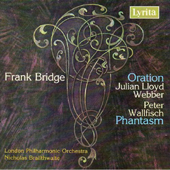
ESSENTIAL RECORDINGS

A dense fog rolls in and obliterates everything it covers in a shroud of fears and dark memories. Thus begins Oration by Frank Bridge, and aptly so as it is a musical work lamenting the loss of a way of life during the First World War. Written in 1930 and conceived as a Concerto Elegiaco for Cello and Orchestra it attempts to emotionally re-visit in obscure memories the horrors and futile efforts of the war. It is laid out over eight short movements without pauses and is more of a fantasia than a concerto because the solo instrument is an integral part of the orchestral canvas. It doesn't suddenly launch into dramatic virtuoso passages on its own while the orchestra members take a short break. Instead most of the action in this captivating work occurs within the orchestra, with the cello speaking, or rather "orating" over the shifting orchestral background. Frank Bridge is very good at pairing opposing forces, with the orchestra going in one direction and antagonising the cello, whilst the soloist responds by playing something foreign and opposite to the musical discourse. The composer makes that work to his advantage by creating a constant state of tension and flux to great effect. Most of the work is dark and brooding, but the inner movements introduce the conflict of war, with the use of martial rhythms and heavy percussion in the Allegro giusto emphasizing the destructive aspect of war. The Epilogue on the other hand, with its quiet and repetitive motif resembling the passage of time, will linger on your mind long after it ends. At its premiere in 1936, this work must have seemed very modern based on the standards of the day, but time has a way of dulling sharp edges and it now sounds almost romantic by today's standards. Julian Lloyd Webber produces a tone in his playing that fits the music's idiom very well and never loses focus on the music's intent.
The Phantasm, a work for piano and orchestra composed only a year later, is quite a different story. It is much more severe, more serious in nature, more atonal in harmonic progression and pits the soloist against the orchestra in constant struggles and conflicts that ebb and flow from soft murmurs to agitated outcries. There is a constant sense of momentum in this work, and this time it's the soloist that bears the brunt of the work. The moods are in constant shift from march tempos to waltz like passages, and in the final Allegro an unrelenting pulse builds to a searing and cataclysmic abrupt stop, and then the music quietly slips away into the darkness.
These are two of Frank Bridge's most inspired orchestral works, and are great examples of mid-century British music that should be part of any serious collection. And as always with the label Lyrita, the recording is warm and natural, with a fine balance of forces within natural acoustics.
Jean-Yves Duperron